Four more data briefs have been published since the last newsletter, with continuing focus on engineering transfer student retention and success. Additional data briefs are planned for this year.
How Learning Communities Affect Retention shows that students who participate in a learning community their first year are more likely to be retained through that year than are students who do not engage in a learning community.
Engineering Transfer Student—Graduate Profile helps to better understand engineering transfer students by comparing their placement status upon graduation to placement for engineering students who entered Iowa State directly from high school.
Retention provides comparisons in retention between engineering transfer students from Iowa Community Colleges and engineering students entering Iowa State directly from high school. This brief reinforces the importance of learning communities in retention.
Basic Program—Empirical Research Results details empirical information related to success in engineering at Iowa State based on academic factors in the Basic Program for community college students.
SEEC Team Presents
SEEC team members continue to spread the word about various SEEC topics at home and abroad.
Taking the Road Less Traveled Conferences, Iowa Communities
Introducing CYSTEM
Presented by Holly Bignall and Monica Bruning, Iowa State University
Conference on Diversity in Science, Technology, Engineering, and Math, Ankeny, Iowa
Strategies to Increase Transfer Students in Engineering
Presented by Diane Rover, Mack Shelley, Mary Darrow, and Marcia Laugerman, Iowa State University and Kari Hensen and Randy Smith, Des Moines Area Community College
Changing the Conversation: Messages for Improving Public Understanding of Engineering
Presented by Mary Darrow and Carol Heaverlo, Iowa State University
Engineering Sparks and Pathways for Talented Minority Girls: FREE Project (Female Recruits Explore Engineering)
Presented by Monica Bruning, Iowa State University
ASEE Annual Conference & Exposition, Vancouver, British Columbia
Characteristics of Community College Students that Successfully Graduate in Engineering
Presented by Marcia Laugerman, Iowa State University
Also published in the 2011 ASEE Annual Meeting conference proceedings
Community College Summit, Ames, Iowa
Introduction and Discussion of Student Success Data
Facilitated by Jonathan Compton, Laura Doering, Dave Holger, Jason Pontius, and Diane Rover, Iowa State University
Creating Pathways for STEM Transfer Student Success
Presented by Frankie Santos Laanan, Iowa State University
10th Annual National Institute for the Study of Transfer Students, Fort Worth, Texas
STEM Student Enrollment and Engagement through Connections (SEEC): Using Data to Inform Transfer Programming
Presented by Frankie Santos Laanan, Mary Darrow, Diane Rover, Steve Mickelson, Monica Bruning, Mack Shelley, and Marcia Laugerman, Iowa State University
SEEC Team Meets to Share Data
SEEC team members from both Iowa State and DMACC, along with members of their internal advisory boards, met in May to share data, compiled by Iowa State, regarding engineering transfer student success.
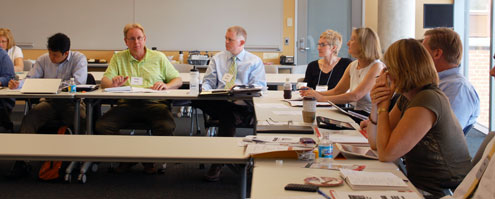
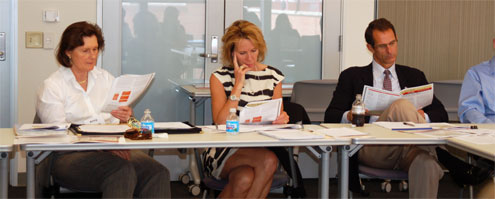
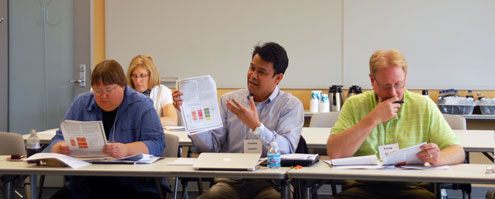
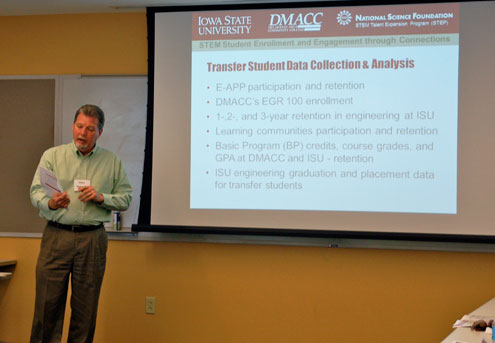
SEEC Project Initiatives Continue to Grow
E:TEC Scholarship Program
The E:TEC scholarship program is now in its fourth year. This year, 83 incoming engineering students from 49 counties across Iowa were chosen to receive this one-time $500 merit-based scholarship.
| E:TEC Scholarship Awards | Fall 2011 | Fall 2010 | Fall 2009 |
| Total Applications | 134 | 50 | 63 |
| Total Counties (of all applicants) | 49 | 37 | 29 |
| Total Awards | 83 | 39 | 51 |
| Total Women (awarded) | 25 | 8 | 7 |
| Total URM (awarded) | 8 | 5 | 4 |
| Total Transfer (awarded) | 16 | 6 | 3 |
EGR 100
EGR 100, Des Moines Area Community College’s pre-engineering class, has expanded from the Ankeny campus to Boone as more and more pre-engineering students enroll.
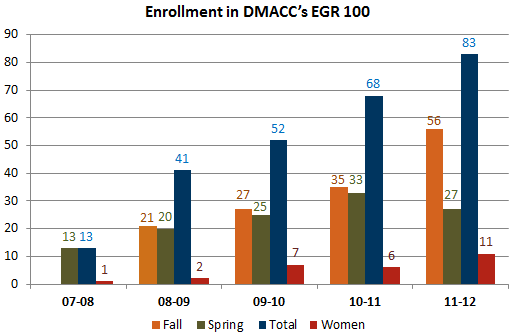
E-APP
More and more engineering transfer students from Iowa's community colleges are enrolling in E-APP.
| E-APP Enrollment | 2007 | 2008 | 2009 | 2010 | 2011 |
| Total | 59 | 79 | 136 | 137 | 145 |
Connected!
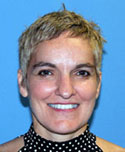 |
Renee White Professor, Civil Engineering Technology Des Moines Area Community College DMACC Institutional Advisory Board, SEEC Project |
By working with the SEEC team at Iowa State and DMACC, White has been able to formalize the curriculum so that DMACC pre-engineering students, if they choose, can take the entire Basic Program at DMACC and make a seamless transfer to Iowa State’s College of Engineering as a sophomore. The Boone campus is entering its second year of offering the Basic Program, and it is also offered at the Ankeny campus, with plans to expand to the Hunziker Center in Ames this fall.
White notes that the SEEC project has provided valuable data to DMACC in terms of transfer student success. “Data that has come out of the meetings between DMACC and Iowa State has been very powerful. It gives us a better understanding of the problems that can arise through transfer and we can use the data to address them,” she stated. To that end, DMACC has been formalizing their pre-engineering efforts and educating their advisers about the challenges transfer students face. Advisers have been given information about the Engineering Admissions Partnership Program (E-APP), a formal planner for engineering transfer, and a consistent set of messages to use to foster engineering transfer student success.
Now that the Basic Program is in place and there is a formal structure to help pre-engineering students navigate their pathway to Iowa State, White notes, “The next big push will be recruiting.” A brochure to promote DMACC’s pre-engineering degree and its pathway to Iowa State has been developed with input from SEEC team members. Its language incorporates some of the National Academy of Engineering’s recommendations from “Changing the Conversation.” “This brochure is just getting into the hands of our recruiters,” explains White. But she expects many more students to connect to engineering through DMACC and then to Iowa State once the word is out that there is yet another pathway available to engineering.

|
Marcia Laugerman Research Assistant, Iowa State University |
Marcia Laugerman, Research Assistant at Iowa State University, was brought on board the SEEC project by co-principal investigator Steve Mickelson. Laugerman’s role is to identify and analyze data relative to SEEC program objectives and with respect to the challenges and successes of Iowa State engineering transfer students. “To the best of our knowledge, no one has measured the success of community college transfers as a group to engineering. Normally community colleges would study this, but they don’t have access to our [Iowa State’s] data. Collaboration between Des Moines Area Community College (DMACC) and Iowa State through the SEEC project has allowed us to track the success of community college transfers,” explains Laugerman of the research.
Success for engineering transfer students is measured by retention and graduation, with academic variables and the effects of connection-based strategies from the SEEC program analyzed for their influence on this success. “Connection-based strategies have shown to have significant positive impact on one-year retention rates of community college engineering transfer students,” notes Laugerman. This means advisers and other influencers can see this data and understand that encouraging transfer students to get involved in programs such as E-APP prior to transfer and in learning communities at Iowa State after transfer will increase their chance for success. (See SEEC Data Brief: How Learning Communities Affect Retention for details.)
Academic variables relative to the engineering Basic Program were also analyzed in a unique study that matched transfer student grades with grades of those entering directly from high school. (See SEEC Data Brief: Basic Program — Empirical Research Results for details.)
“Ultimately the results of this research will affect advising, decision making and policy making strategies for the transfer student in engineering,” states Laugerman, “All with the objective of increasing success in engineering.”

